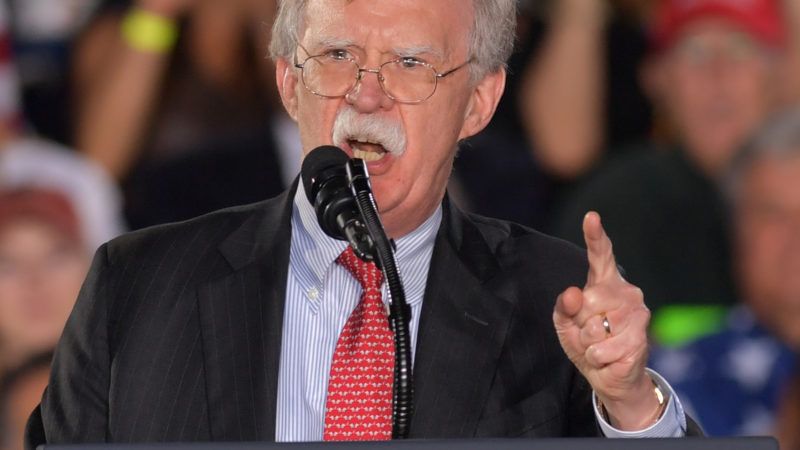Citing National Security, the Trump Administration Says John Bolton Can't Publish His Book
The attempted muzzling of the former national security advisor is dubious.

The White House sent a threatening letter to former National Security Advisor John Bolton's attorneys declaring that his forthcoming book, The Room Where It Happened: A White House Memoir, is a threat to national security and cannot be published.
"Based on our preliminary review, the manuscript appears to contain significant amounts of classified information," wrote Ellen Knight, senior director for records at the National Security Council, in the letter to Bolton's attorneys. "The manuscript may not be published or disclosed without the deletion of this classified material."
The full letter was obtained by CNN's Jake Tapper:
WH letter to Bolton warning him against publication of his book as it is right now pic.twitter.com/dsICaKQuJe
— Jake Tapper (@jaketapper) January 29, 2020
Bolton has indicated that he would be willing to testify at the president's impeachment trial in the Senate, though it's currently unclear whether there are enough Republican senators who will vote to allow witnesses at all. Bolton may have information that is damaging to Trump's defense. As Reason reported previously:
In a book that is soon to be released, Bolton says that Trump held up $391 million in congressional authorized security assistance from Ukraine so he could pressure President Volodymyr Zelenskiy into announcing investigations that zeroed in on Trump's political rivals, namely former Vice President Joe Biden. In December, Trump was impeached by the House on abuse of power and obstruction of Congress in connection with the incident.
The Bolton allegations threw a wrench into the Senate trial as Republicans mull if they want to introduce witnesses and additional evidence after arguments conclude. Lawmakers will need a simple majority to hear new testimony, and Sens. Mitt Romney (R–Utah) and Susan Collins (R–Maine) have expressed that they will likely vote in favor. Senate Majority Leader Mitch McConnell (R–Ky.) has emphasized the need for speedy proceedings and expressed his desire that no witnesses be called.
Senate procedure is one matter. But regardless of whether Bolton is able to present his information at the trial, it's incredibly suspicious for the White House to seek to suppress the book itself. The administration should not be able to invoke the dreaded specter of "national security" every time someone is prepared to say something that might cause the government embarrassment. This is reminiscent of the efforts to stop whistleblower Edward Snowden from publishing his own book about the federal government's vast ability to spy on U.S. citizens. Knowing that it was unlikely the very power apparatus his book was criticizing would give him a fair shake, Snowden opted not to submit his manuscript for government review, which led a court to rule that the authorities could seize the book's profits.
There are, some legitimate secrets the government has an interest in protecting—the names of intelligence assets, for instance—and it's not wrong for the White House to review a former top advisor's book for inadvertent slips. But there's reason to be deeply skeptical that the White House's concerns are related to these actual, sensitive matters. The president himself recently characterized Bolton's potential testimony as a national security issue along the following lines:
"When [Bolton] knows my thoughts on certain people and other governments, and we're talking about massive trade deals and war and peace and all these different things that we talk about, that's really a very important national security problem," Trump told reporters in Davos, Switzerland.
Bolton knowing Trump's "thoughts on certain people and other governments" may be embarrassing for the administration, but it is not a rational basis upon which to censor him. Too often, national security is invoked to quell legitimate questions about government operations.
Readers should not be deprived of access to Bolton's book. They may end up rejecting its relevance, truthfulness, indictment of Trump—indeed, there are many good reasons to be skeptical of Bolton in general—but that's for the American people to decide, not the national security state.


Show Comments (151)